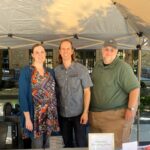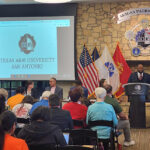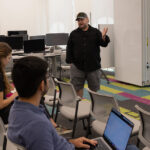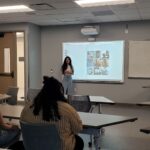Perhaps the socioeconomic issues that San Antonio faces today were built into the very foundation of the city, a social scientist said at a speech at Texas A&M University-San Antonio April 8 in the Vista Room of the Central Academic Building.
“We can disrupt the process if we understand how socioeconomic segregation came about,” said Dr. Christine Drennon, director of the urban studies program at Trinity University.
An audience of 80 listened to her speech covering the history of economic segregation and social inequality in the inner city.
She suggested that the social segregation that San Antonio faces leads back to property ownership.
Drennon presented the deeds of the city’s original neighborhoods, like Beacon Hill, which explicitly stated that non-whites would not be allowed to live there. Even before these neighborhoods were built, segregation became part of their very foundation.
The locations of these neighborhoods correlate with where higher-income families live today, whereas neighborhoods that allowed for diversity from the very beginning usually house lower income families.
“As a social scientist, I look for social patterns. In San Antonio, inequality has become a pattern,” Drennon said.
Drennon said this separation affects the education system. She pointed out how some school districts who serve a more wealthy demographic often still receive more funding than those who serve a community that has greater economic need.
Students who go to schools in “red flagged” districts are less likely to pass standardized tests and often fail to meet state standards of education. Drennon said this has to do with their lack of funding.
“By separating people based on their ethnic background or social status, we take away any opportunity for growth — socially and economically,” Drennon said.
Drennon highlighted the closing of Rodriguez Elementary School as a result of low success rates among students. She lamented the fact that these students will now be bussed to different schools, away from their friends and teachers, which would disrupt their learning.
“The system decides to mix it up instead of trying to improve what we already have, and that leads to schools closing their doors. We have to disrupt the process,” Drennon said.
After Drennon wrapped up her speech, the attendees were given the opportunity to share their thoughts and ask questions during a Q&A.
Alejandra Pena, a bilingual education sophomore, shared that she had experienced firsthand how the education system mistreats students who attend schools in low-income areas.
“When we did well in our AP Spanish, people acted suspicious of our success, just because of what school we went to,” Pena said.
Pena graduated from Southside High School. Drennon thanked her for sharing some of her experiences with those listening.
Drennon’s speech was sponsored by the President’s Commission on Equity at Texas A&M University-San Antonio.






